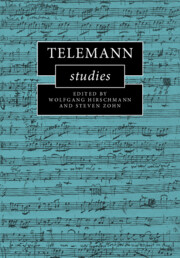Book contents
- Telemann Studies
- Cambridge Composer Studies
- Telemann Studies
- Copyright page
- Contents
- Figures
- Music Examples
- Tables
- Appendices
- Contributors
- Preface
- Abbreviations
- Part I Enlightenment Perspectives
- Part II Urban and Courtly Contexts
- Part III Nature (and) Theology in the Late Vocal Works
- Part IV Bach Family Connections
- Part V Cantata Cycles in Frankfurt, Hamburg, and Beyond
- 13 Recitative Notation in Telemann’s Church Cantatas
- 14 Telemann’s Stolbergischer Jahrgang (1736–1737) in the Context of His Sacred Cantata Cycles
- 15 Telemann’s Cantata Cycle of 1733–1734
- 16 Under the Reign of Telemann’s Sacred Cantata Cycles
- Index of Telemann’s Works
- General Index
13 - Recitative Notation in Telemann’s Church Cantatas
from Part V - Cantata Cycles in Frankfurt, Hamburg, and Beyond
Published online by Cambridge University Press: 14 July 2022
- Telemann Studies
- Cambridge Composer Studies
- Telemann Studies
- Copyright page
- Contents
- Figures
- Music Examples
- Tables
- Appendices
- Contributors
- Preface
- Abbreviations
- Part I Enlightenment Perspectives
- Part II Urban and Courtly Contexts
- Part III Nature (and) Theology in the Late Vocal Works
- Part IV Bach Family Connections
- Part V Cantata Cycles in Frankfurt, Hamburg, and Beyond
- 13 Recitative Notation in Telemann’s Church Cantatas
- 14 Telemann’s Stolbergischer Jahrgang (1736–1737) in the Context of His Sacred Cantata Cycles
- 15 Telemann’s Cantata Cycle of 1733–1734
- 16 Under the Reign of Telemann’s Sacred Cantata Cycles
- Index of Telemann’s Works
- General Index
Summary
On the evidence of manuscript sources, Telemann’s recitative notation in church cantatas falls into three phases that correspond to stylistic developments. In his early cantatas (1710 – ca. 1724), the composer uses mainly delayed notation for cadences, nondelayed notation appearing only when the continuo has a chord change directly following a cadence. After the Harmonischer Gottes-Dienst cycle (1725–26), cadence notation is standardized to the nondelayed type. But delayed notation appears again in the 1750s. A revealing case study is furnished by a group of cantatas from the Schubart-Jahrgang (1731–32) and their abbreviated versions published in the Fortsetzung des Harmonischen Gottes-Dienstes (1731–32). For the full versions of the cantatas, we have only Johann Balthasar König’s manuscripts from Frankfurt am Main (1741–42), and these, curiously enough, display the delayed notational practice that predates the Harmonischer Gottes-Dienst. By contrast, the Fortsetzung versions of the cantatas include only the newer, nondelayed notation. Thus the readings of the König manuscripts can be shown to reflect his practice rather than the composer’s.
Keywords
- Type
- Chapter
- Information
- Telemann Studies , pp. 273 - 284Publisher: Cambridge University PressPrint publication year: 2022

